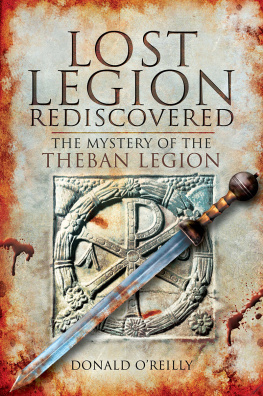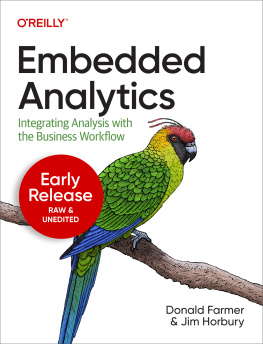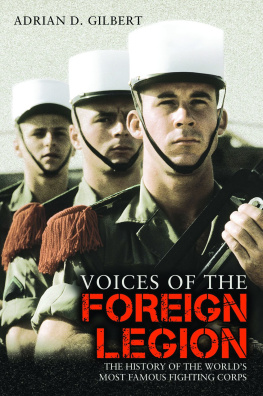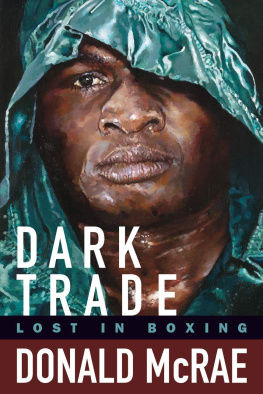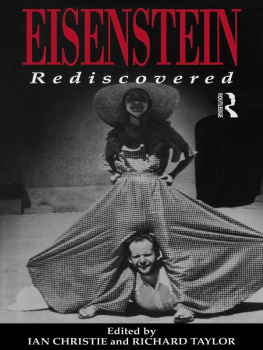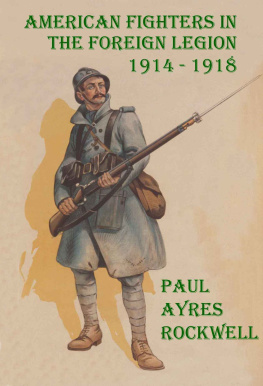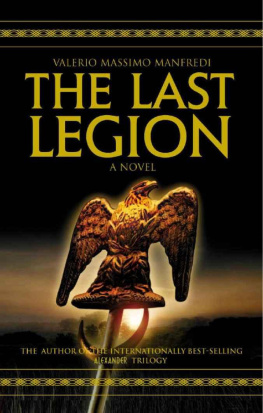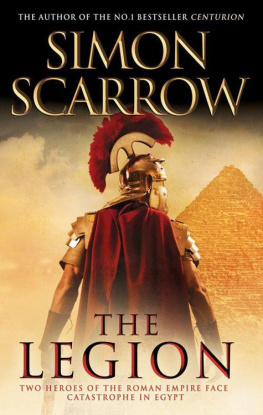Donald OReilly - Lost Legion Rediscovered
Here you can read online Donald OReilly - Lost Legion Rediscovered full text of the book (entire story) in english for free. Download pdf and epub, get meaning, cover and reviews about this ebook. year: 2014, publisher: Pen & Sword Books, genre: Religion. Description of the work, (preface) as well as reviews are available. Best literature library LitArk.com created for fans of good reading and offers a wide selection of genres:
Romance novel
Science fiction
Adventure
Detective
Science
History
Home and family
Prose
Art
Politics
Computer
Non-fiction
Religion
Business
Children
Humor
Choose a favorite category and find really read worthwhile books. Enjoy immersion in the world of imagination, feel the emotions of the characters or learn something new for yourself, make an fascinating discovery.
- Book:Lost Legion Rediscovered
- Author:
- Publisher:Pen & Sword Books
- Genre:
- Year:2014
- Rating:4 / 5
- Favourites:Add to favourites
- Your mark:
- 80
- 1
- 2
- 3
- 4
- 5
Lost Legion Rediscovered: summary, description and annotation
We offer to read an annotation, description, summary or preface (depends on what the author of the book "Lost Legion Rediscovered" wrote himself). If you haven't found the necessary information about the book — write in the comments, we will try to find it.
Lost Legion Rediscovered — read online for free the complete book (whole text) full work
Below is the text of the book, divided by pages. System saving the place of the last page read, allows you to conveniently read the book "Lost Legion Rediscovered" online for free, without having to search again every time where you left off. Put a bookmark, and you can go to the page where you finished reading at any time.
Font size:
Interval:
Bookmark:

Lost Legion Rediscovered
To my beloved wife, without whose bemused diligence this would've been impossible.
The Mystery of the Theban Legion
Donald OReilly

First published in Great Britain in 2011 by
Pen & Sword Military
an imprint of
Pen & Sword Books Ltd
47 Church Street
Barnsley
South Yorkshire
S70 2AS
Copyright Donald OReilly 2011
ISBN 9781-84884-378-3
eISBN 9781-52677-990-8
Mobi ISBN 978152677-991-5
The right of Donald OReilly to be identified as Author of this Work has been asserted by him in accordance with the Copyright, Designs and Patents Act 1988.
A CIP catalogue record for this book is available from the British Library.
All rights reserved. No part of this book may be reproduced or transmitted in any form or by any means, electronic or mechanical including photocopying, recording or by any information storage and retrieval system, without permission from the Publisher in writing.
Pen & Sword Books Ltd incorporates the imprints of Pen & Sword Aviation, Pen & Sword Maritime, Pen & Sword Military, Wharncliffe Local History, Pen and Sword Select, Pen and Sword Military Classics and Leo Cooper.
For a complete list of Pen & Sword titles please contact
PEN & SWORD BOOKS LIMITED
47 Church Street, Barnsley, South Yorkshire, S70 2AS, England
E-mail:
Website: www.pen-and-sword.co.uk

Map 1: Egypt and the Middle East.

Map 2: The route taken by the Theban legion, March, AD 286.

Map 3: Maximian's campaign against the Baguadae.

Map 4: The Battle of the Milvian Bridge, 28 October, AD 312.
Who knows if the best of man be known?
Or whether there be more remarkable persons forgot?
Thomas Browne
J esus commanded Render to Caesar the things that are Caesars and to God the things that are Gods.
Christians not of Jewish origin in the early Church were mostly Greeks, another people denied access to the army. Auxiliary units were roughly half of the army. Bearing the titles of tribes and nationalities from which they were recruited, none of these units were Greek. This was not the result of requested exemption but discrimination. If Jews disarmed themselves, it suited Rome. Greeks were stereotyped as too clever, ambitious and clannish. Most Christians in the first centuries were pacifists ineligible for army duty.
Religio , to Romans, was literally that which held things together. Cicero in the first century before Christ wrote that Philosophy has never touched the mass of mankind except through religions. He loathed the wretched starving mob, the bloodsucker of the treasury. While writing of his contempt for superstition, publicly he was the exemplar of religiosity, a priest of the imperial cult as a function of office. This to him was not hypocrisy but necessity, fear of the gods essential to keep the ignorant majority from heinous crime.
Romans were to honour the deities of the imperial cult when required by the government. Those in authority and ordinary people sincerely believed not necessarily from the same motives that to deny such rites risked disunity or divine vengeance upon society. To refuse was uncivil, blasphemous and unpatriotic. Jesus had warned that the day shall come when they will persecute and kill you honestly believing that they are doing a service to God.
This religiosity was manifest in the ceremonies of the army. In the Roman era the Judaic religious document called the War Scroll of the Dead Sea Scrolls identified the sons of darkness, the enemies of God and Israel, as those who march about in formation and worship military standards as their idols.
The sacramentum , the pagan military oath, was not taken individually but by officers acting as representatives. A baptized soldier required to take the oath would be faced with a choice between losing his life or losing his soul as Christians saw it.
The Roman Empire had no military conscription except the rare dilecta or draft, which applied only to Italians. Its soldiers were volunteers enlisted for a minimum of twenty-five years. Slaves, city welfare recipients, serfs, criminals and gladiators were barred. As the middle class of free farmers, whether small landowners, hired hands, tenants or share-croppers, was ever decreasing so too was the Empires pool of recruits. Christians refused to serve as soldiers or officials and were understandably resented by pagans.
The early Church refused baptism to soldiers as well as pimps, prostitutes, slave dealers, gladiators, actors, and teachers. The objection to the latter was not their job but the pagan content of the usual curriculum.
The moral priority of the gospels is the de-escalation of violence. To Mohandas Gandhi, violence was anything dehumanizing.Violence began within a person as self-pity, self-hatred, insult, prejudice, racism, contempt, lies, cowardice, exaggeration and the like. The Stoic Emperor Marcus Aurelius remarked that Refusing to imitate is the best revenge. To turn the other cheek was to refuse to take insult to heart as the insulter desired. It defused escalation of violence. It did not deny the right of self-defence nor the moral obligation to defend those with claim protection.
Roman slaves were set free by their masters in a public rite in which the slave was slapped on one side of the face and then the other. Ages later this alapsa became the touch on each shoulder with the flat of a sword, the accolade that made a man a knight. The recipient in not retaliating demonstrated goodwill.
Baptized Christians were excommunicated if they entered the Roman army but soldiers on active duty were attracted to Christianity nonetheless. Catechumens, initiates, not baptized, were allowed to participate only partially in Christian worship. Upon retirement, soldiers, if catechumens, could be baptized.
Soldiers of Christian creed received few guidelines from Church philosophers, remote from the battle zones. In response to situations confronting them they hammered out their own military morality. While the Acts give the impression that they were acting in isolation, comparative analysis shows that they increasingly acted in unison as their numbers grew.
It has been held that the sacramentum , the pagan military oath, was the sole reason that soldiers were denied baptism. This implies that obeying orders to kill was no problem in conscience to Christians in the army. Here, emphasis will be on the deeds of the martyrs rather than the philosophy of the Church fathers; events enacted in sweat and blood, not abstract theory.
Violence can be de-escalated but is better not initiated but deterred. Deterrence is best effected by professional military or police. Yet, the worst crimes in history have been committed by normally decent men blindly obedient to military orders.
Font size:
Interval:
Bookmark:
Similar books «Lost Legion Rediscovered»
Look at similar books to Lost Legion Rediscovered. We have selected literature similar in name and meaning in the hope of providing readers with more options to find new, interesting, not yet read works.
Discussion, reviews of the book Lost Legion Rediscovered and just readers' own opinions. Leave your comments, write what you think about the work, its meaning or the main characters. Specify what exactly you liked and what you didn't like, and why you think so.

